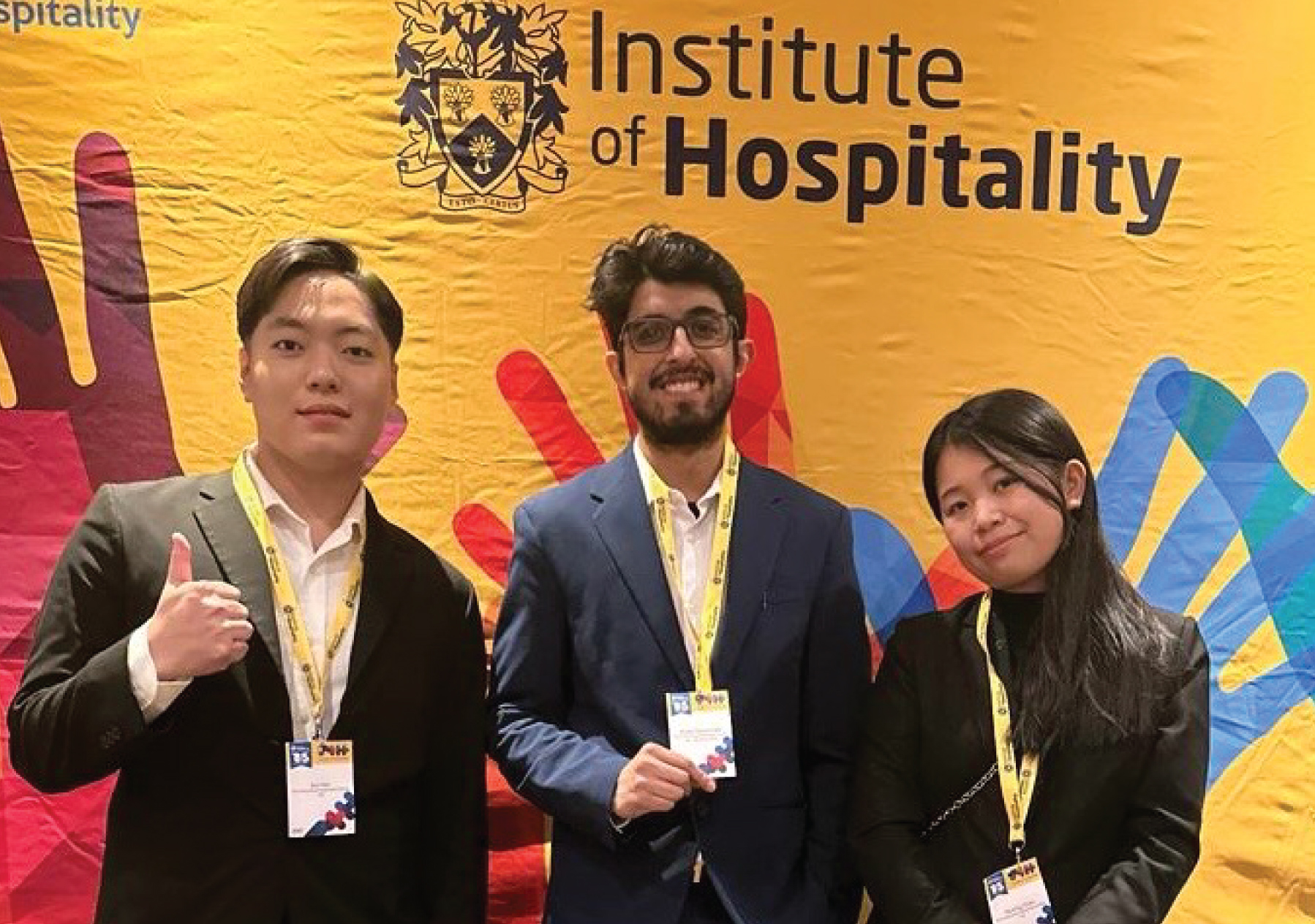The Institute of Hospitality (IoH) focuses on career development, networking, and advancing hospitality management. Our passion for hospitality inspired us to join and learn from industry leaders. We were especially drawn to the 'Women in Leadership' project, highlighting women’s roles in the sector. We organized events featuring speakers like Ms. Winnie Woo and Ms. Michelle Liu, showcasing their insights. As a team, we coordinated event planning, secured speakers, and managed logistics. Collaborating with Freshlane, we hosted a seminar and a snack stand, which allowed us to develop our project management, problem-solving, and teamwork skills, overcoming challenges to achieve success.

Ms. CHEN Ruoting Alinda
Mr. DULARAMANI Aryan Prakash
Mr. HAN Sol
School of Hotel and Tourism Management
Managing resources efficiently is a critical aspect of event planning. This includes budgeting, sourcing materials, and handling logistical challenges. The example of negotiating with Freshlane for menu selection and delivery highlights the importance of resource management. Limited budgets require creative solutions, such as partnering with vendors or leveraging institutional support. Ensuring compliance with food safety regulations and managing on-site logistics are also key to providing a seamless experience for attendees.
Clear and effective communication is essential for event planning. This includes internal communication within the team and external communication with stakeholders, participants, and the audience. Promoting events through various channels, such as digital content, emails, and social media, helps reach a wider audience. The support from PolyU in promoting events was instrumental in attracting a diverse group of attendees, enhancing networking opportunities and enriching the event experience.
Event planners must be prepared to adapt to unforeseen challenges. For instance, when a scheduled speaker, Ms. Michelle Liu, became unavailable, the team had to quickly reschedule and update all marketing materials. This situation required effective problem-solving skills and the ability to communicate changes positively to maintain stakeholder engagement. Adaptability is crucial for managing such unexpected changes without compromising the event's success.
A structured approach to event planning is vital for its success. The process involves a series of well-defined stages, including conceptualization, planning, implementation, and execution. Each stage requires meticulous attention to detail and careful coordination. For example, organizing events took up to three months, involving tasks like securing guest speakers, coordinating logistics, and managing promotional activities. Effective time management and delegation were necessary to ensure that every aspect of the event was executed smoothly.
Event planning heavily relies on effective collaboration and networking, as demonstrated by the partnerships formed with industry leaders such as Ms. Winnie Woo and Ms. Michelle Liu. Establishing connections with influential figures can enhance the event's appeal and credibility. The use of advisors and personal networks, as shown by the involvement of Dr. Linda Woo, was crucial in securing high-profile speakers and participants. This approach not only enriches the event content but also broadens its reach and impact.
Engaging with various stakeholders, such as industry leaders, faculty members, and team members, required clear and effective communication. This included both written and verbal skills to ensure that information was accurately conveyed, and feedback was properly understood and implemented.
The ability to think creatively and adapt to unexpected hurdles, such as changes in speaker availability or logistical issues, was vital. Problem-solving skills were honed through analyzing challenges, brainstorming solutions, and implementing them effectively to ensure the success of the events.
Organizing events and coordinating various tasks necessitated strong time management abilities. This involved setting deadlines, allocating tasks, and ensuring that all activities were completed on schedule. Time management was crucial to keep the project on track, especially when dealing with unexpected changes or challenges.
Leading and organizing events from conceptualization to execution required strong project management skills. This included planning, organizing resources, managing budgets, and ensuring all aspects of the project were aligned with the overall objectives. Effective project management ensured the smooth execution of events.
Working collaboratively with a team and leading as a chapter president involved leveraging each member’s strengths and providing support through challenges. Building a cohesive team, delegating tasks, and fostering a collaborative environment were essential for the project's success, highlighting the importance of teamwork and leadership in achieving common goals.
The pursuit of knowledge is a lifelong journey! To further expand your knowledge and continue your personal and professional growth. Click and explore the following learning resources:
Resource Management and Logistics
Adaptability and Problem Solving
Project Management and Organization
Communication and Presentation Skills
Critical Thinking and Problem-solving